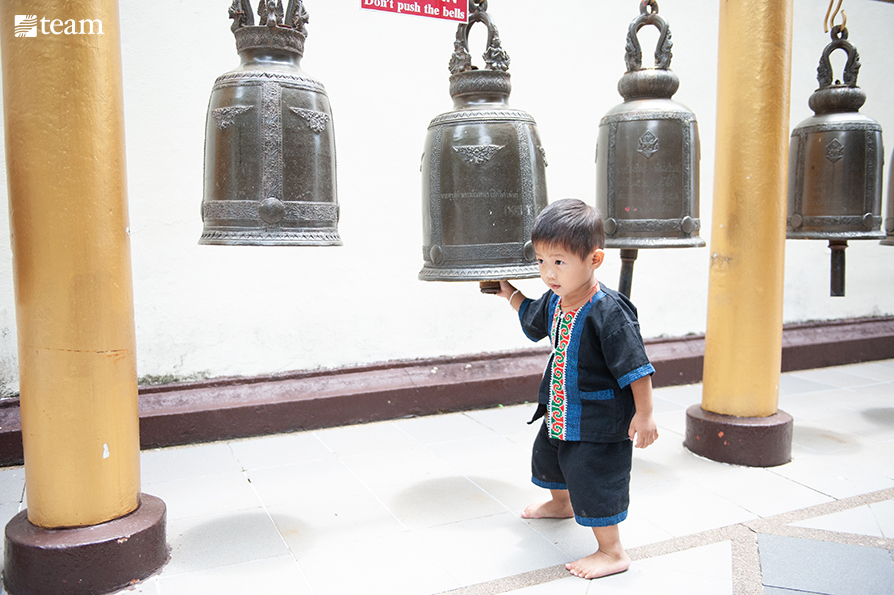
Prayer Focus
True Enlightenment in Christ: Praying for Buddhists
April 1, 2022
by Suzanne Pearson

There is a Japanese adage that says, “The nail that sticks out gets hit!” This mindset of not wanting to stand out or be different from others is a pervasive way of thinking among Buddhist cultures. The cost for Buddhists to follow Christ is often great as they attract the attention of their family and friends in a way that may not be pleasant.
Over 500 million people ascribe to Buddhism worldwide, and most of those are concentrated in Asia. Countries such as China, Japan, Thailand and Myanmar have deeply rooted Buddhist traditions and beliefs, accounting for hundreds of people groups in need of the Gospel.
Over the last several months, we’ve been focusing on specific ways to pray for followers of major world religions (Get up to speed on those posts here for Hinduism, Islam and Atheism). In this post, we focus on how to pray for Buddhists.
Buddhism holds that humanity is marked by suffering and that the ultimate goal is to achieve enlightenment (“Nirvana”) through meditation and other spiritual disciplines. Buddhism presents its own set of challenges as people need courage and conviction to bring their thinking in line with biblical truth. Here are 3 specific ways you can pray for Buddhists.
1. Pray for an understanding of the EXCLUSIVITY of the Gospel.
Jeff M., a TEAM worker in Thailand, says that many Buddhists don’t practice a “pure” form of Buddhism, but rather a mixture of Buddhist ideology along with other religious traditions and animism. Because of this pluralistic worldview, Buddhists are often open to Christian ideas but want to add them to their existing theology.
Jeff notes that it’s been said that “sharing the gospel with a Buddhist is like cutting through water with a knife – it is easy, no friction, no sparks, no conflict, but also no results after you’re done…it just goes right back to how it was.” He adds that it is difficult for Buddhists to understand the idea of absolute truth and that contradictory worldviews present a problem.
Pray for Buddhist people to comprehend the truth of Acts 4:12, that salvation comes through Christ alone.

For a Buddhist, the ultimate goal is to achieve enlightenment (“Nirvana”) through meditation and other spiritual disciplines. Pray for Buddhist people to find instead the light of the Gospel.
2. Pray for BOLDNESS to be counter-cultural for Christ.
Stella C. served as a TEAM missionary in Japan for 65 years, so she is no stranger to the challenges of reaching Buddhist people. (Read more about Stella here.) She speaks of the strong family ties which govern their everyday lives. Buddhists are often afraid to speak out or go against the traditions kept by generations before them. “They think they must worship the dead and go to shrines and graveyards at various times of the year,” Stella says.
Jeff agrees. He shares a specific example of the challenges a Buddhist-turned-Christian might face:
“Young Thai men are expected to become a monk for a few weeks to a few months as repayment [to their mothers] for raising them, without which Thai mothers feel very little hope for a better reincarnation. So, if a young Thai man becomes a Christian, and refuses to enter the monkhood, you can imagine how rejected and abandoned their family (especially their mother) feels. We have a former Buddhist friend who became a Christian and thus never entered the monkhood, and he still feels guilty that he never was able to do that for his mother, even though he knows the entire system to be false!”
Pray for new believers in Christ as well as those contemplating the Gospel to have courage and boldness to follow Jesus despite the cost.
3. Pray for Buddhists to find HOPE in a relationship with Jesus Christ.
“A lot of Buddhists here don’t feel much hope for a better next life,” notes Jeff. “They believe they must ‘make merit’ to get good karma and hopefully a better reincarnation, but they often are content to settle just for better things in this life.”
Stella sees this play out in the increasing role of materialism and busyness in Japanese and Buddhist culture. “[People] are so involved with their jobs, sports, etc. that they don’t have time to think about the existence of the true God.”
Often it is only when hardships come – such as sickness or difficulties within the family – that Buddhists can begin to seek the hope that is found only in Christ. “That is an opening for the Gospel,” says Jeff. “Jesus came for the sick, not the healthy, and we don’t need to make our own merit. He is our righteousness. He covers our shame. We don’t need to make ourselves fit for him, but He has come down to our level to save us from the cycle of pain and death.”
Pray for Buddhist people to “have the eyes of their hearts enlightened, that they may know the hope to which he has called them.” (Ephesians 1:18, ESV)

